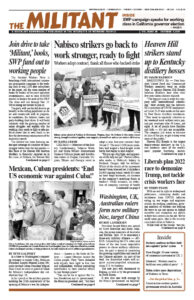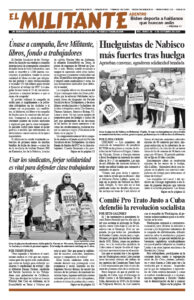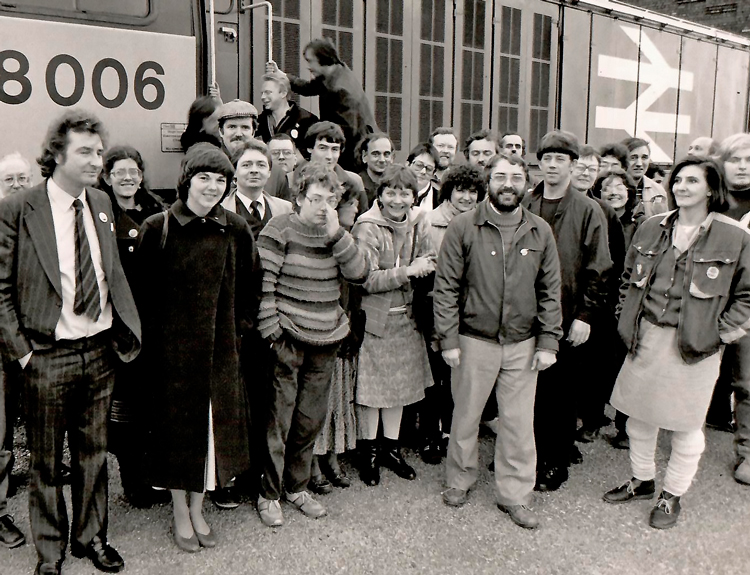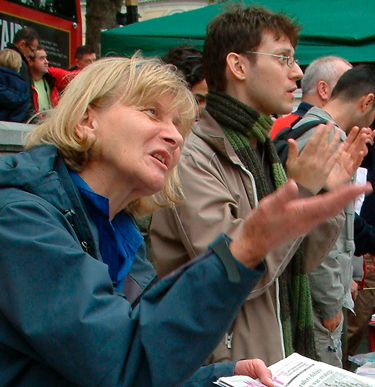LONDON — Forty people attended a meeting hosted by the Communist League to celebrate the life and political contributions of Rose Knight here Sept. 4. A 50-year veteran of the communist movement, she died June 26 after a long illness.
Participants came from the U.K., Northern Ireland, France and Belgium, and the meeting would have been bigger but for international travel restrictions. Thirty messages were sent to the gathering, including from leaders of the CL’s sister parties in Australia, Canada, New Zealand and the U.S. A display of photos and clippings on the wall brought to life different periods of Knight’s life.
“We’re holding this celebration at a time of crisis-driven assaults on working people,” Jonathan Silberman said, welcoming participants on behalf of the CL’s Central Committee. “Capitalism’s world disorder is accelerating in ways that even two years ago none of us would have predicted. It points to the need for a revolutionary struggle for workers power and the building of a communist party —– the task to which Rose Knight dedicated her entire adult life.”
Pete Clifford, a CL leader and organizer of its Manchester branch, told participants that Knight moved to Doncaster in South Yorkshire in 1988 to strengthen the League’s political work in the coalfields and help build a fraction of the CL in the National Union of Mineworkers. There she worked in the unions supporting the struggle to bring down apartheid rule in South Africa; campaigned against the rulers’ war on Iraq; and organized speaking tours for leaders of Cuba’s socialist revolution, strengthened by a trip she made to Cuba in 1992 with her husband Nick Beeton.
As part of the turn of the world communist movement towards industrial unions, Knight became one of the first women to get hired as a freight rail guard. During the 1984-85 coal miners’ strike, she was part of a solidarity delegation of National Union of Railwaymen members to Coalville, Leicestershire, where rail workers blocked the movement of coal to support the miners. The delegation helped break “the isolation of the Coalville rail workers,” Clifford said, and “pushed back bosses’ attempts to sack them.”
As communists take advantage of “new openings to join labor battles as part of unions,” Paul Mailhot wrote on behalf of the Political Committee of the Socialist Workers Party in the U.S., “our international movement needs the example of trained cadres like Rose. Comrades who over decades responded to the opportunities to act in the class struggle, stayed firm in the fight to build the party, and forged a communist vanguard internationally.”
In a message to the meeting, Paul Davies described working with Knight in a meatpacking plant in 2002, where she confronted a manager with a reputation as a bully and who had sexually harassed her. With support from her workmates she forced him to back down. Bullying of young men by that manager also tailed off.
Knight had joined the Communist League’s forerunner, the International Marxist Group, in the early 1970s. “Rose and other IMG members were nationally respected leaders of fights for women’s rights when I joined,” Pamela Holmes, a leader of the CL’s London branch, told the meeting, recalling Knight’s contribution to the fight to defend women’s right to choose abortion. Through this activity she became a seasoned cadre in mass work, which was to stand her in good stead throughout her life.
When declining health no longer allowed her to work in industry, Knight took responsibility for the packing and shipping of books by communist leaders and mailing out the Militant to subscribers. She worked closely with Jim Spaul, a CL leader and veteran coal miner. Both “made a strong first impression” on those visiting the CL’s headquarters to find books or seek discussion, wrote Socialist Workers Party leader Norton Sandler in a message. Sandler got to know Knight during trips to the U.K. to collaborate with the CL.
Andrés Mendoza, now a leader of the CL’s London branch, told the meeting, “What struck me most about Rose, as a new recruit to the League, was her dedication to party-building.” Mendoza pointed to her keen interest in the circulation of revolutionary books in Iran, where she lived briefly in her youth.
Silberman called attention to another time when Knight lived outside the U.K. — as a youth in Brazil. “What had a big impact on Rose was the brutality that followed the 1964 military coup,” he said. “This is what the ruling families will resort to, to defend their wealth and power, she would tell others.”
If the working class hasn’t forged the kind of leadership that can lead millions to take power when the opportunity arises, Silberman said, “the propertied rulers will unleash brutality on a scale much greater than in Brazil. It’s to that end that the Communist League, Rose’s party, exists,” Silberman said in a fund appeal. Participants contributed 3,000 pounds ($4,080), then stayed to enjoy a spread of food and more discussion.
Commenting on what he had heard at the meeting, bus driver Joe Williams told the Militant that Knight’s activity “shows that when you say this isn’t right, you get others with you.” Williams first met CL members when he was on strike earlier this year.
Miriam Palacios, a leader of Cubanos en U.K., got to learn about Knight’s life for the first time at the meeting. She “showed how you need to be part of different fights to build a movement against capitalist rule,” Palacios said.



